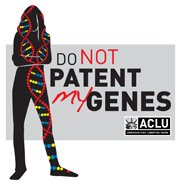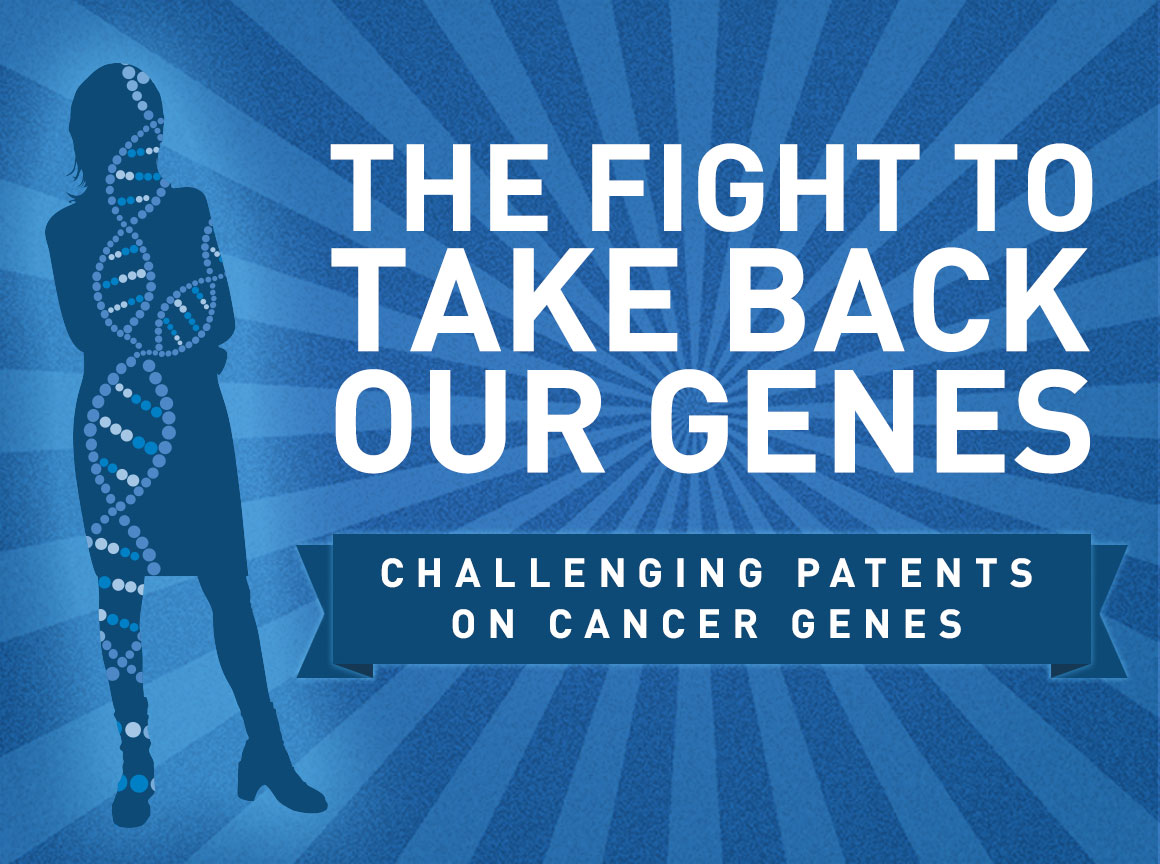Court Upholds Right Of Scientists And Patients To Challenge Gene Patents

ACLU And PUBPAT Lawsuit Challenging Patents On Breast Cancer Genes Can Go Forward
FOR IMMEDIATE RELEASE
CONTACT: (212) 549-2666; media@aclu.org
NEW YORK – A federal district court ruled today that patients and scientists can challenge patents on human genes in court, allowing a lawsuit challenging patents on two human genes associated with hereditary breast and ovarian cancer to move forward.
The lawsuit was filed by the American Civil Liberties Union and the Public Patent Foundation (PUBPAT), a not-for-profit organization affiliated with Benjamin N. Cardozo School of Law. The groups charge that the patents are illegal and restrict both scientific research and patients’ access to medical care, and that patents on human genes violate the First Amendment and patent law because genes are “products of nature.”
“We hope this challenge is the beginning of the end to patents on genes, which limit scientific research, learning and the free flow of information,” said Chris Hansen, a staff attorney with the ACLU First Amendment Working Group. “No one should be able to patent a part of the human body.”
The lawsuit, Association for Molecular Pathology, et al. v. U.S. Patent and Trademark Office, et al., was originally filed on May 12 in the U.S. District Court for the Southern District of New York on behalf of breast cancer and women’s health groups, individual women, geneticists and scientific associations representing approximately 150,000 researchers, pathologists and laboratory professionals. The lawsuit was filed against the U.S. Patent and Trademark Office (USPTO), as well as Myriad Genetics and the University of Utah Research Foundation, which hold the patents on the BRCA genes. The defendants asked the court to dismiss the case but today’s ruling allows the lawsuit to proceed.
Because the ACLU’s lawsuit challenges the whole notion of gene patenting, its outcome could have far-reaching effects beyond the patents on the BRCA genes. Approximately 20 percent of all human genes are patented, including genes associated with Alzheimer’s disease, muscular dystrophy, colon cancer, asthma and many other illnesses.
The court noted the significance of this case. The court’s opinion stated, “The widespread use of gene sequence information as the foundation for biomedical research means that resolution of these issues will have far-reaching implications, not only for gene-based health care and the health of millions of women facing the specter of breast cancer, but also for the future course of biomedical research… The novel circumstances presented by this action against the USPTO, the absence of any remedy provided in the Patent Act, and the important constitutional rights the Plaintiffs seek to vindicate establish subject matter jurisdiction over the Plaintiffs’ claim against the USPTO.”
“We look forward to proving in court that human gene patents should never have been granted in the first place,” said Daniel B. Ravicher, Executive Director of PUBPAT and co-counsel in the lawsuit. “Companies should not able to own the rights to a piece of the human genome. Specific tests or drugs can be patented, but not genes themselves.”
The specific patents the ACLU is challenging are on the BRCA1 and BRCA2 genes. Mutations along the BRCA1 and 2 genes are responsible for most cases of hereditary breast and ovarian cancers. Many women with a history of breast and ovarian cancer in their families opt to undergo genetic testing to determine if they have the mutations on their BRCA genes that put them at increased risk for these diseases. This information is critical in helping these women decide on a plan of treatment or prevention, including increased surveillance or preventive mastectomies or ovary removal.
The patents granted to Myriad give the company the exclusive right to perform diagnostic tests on the BRCA1 and BRCA2 genes and to prevent any researcher from even looking at the genes without first getting permission from Myriad. Myriad’s monopoly on the BRCA genes makes it impossible for women to access alternate tests or get a second opinion about their results and allows Myriad to charge a high rate for their tests.
“The patents on BRCA 1 and BRCA 2 restrict women’s access to genetic testing and interfere with their medical care,” said Sandra Park, staff attorney with the ACLU Women’s Rights Project. “We hope that at the conclusion of this lawsuit, the court declares the patents unconstitutional and invalid.”
Several major organizations, including the American Medical Association, the March of Dimes and the American Society for Human Genetics, filed friend-of-the-court briefs in support of the challenge to the patents on the BRCA genes.
Attorneys on the case include Hansen and Aden Fine of the ACLU First Amendment Working Group; Park and Lenora Lapidus of the ACLU Women’s Rights Project; and Ravicher of PUBPAT. Tania Simoncelli, the ACLU’s science advisor, provides expert guidance on the case.
More information about the case, including an ACLU video featuring breast cancer patients, plaintiff and supporter statements and declarations, today’s decision and the legal complaint, can be found online at: www.aclu.org/brca
Stay Informed
Every month, you'll receive regular roundups of the most important civil rights and civil liberties developments. Remember: a well-informed citizenry is the best defense against tyranny.



